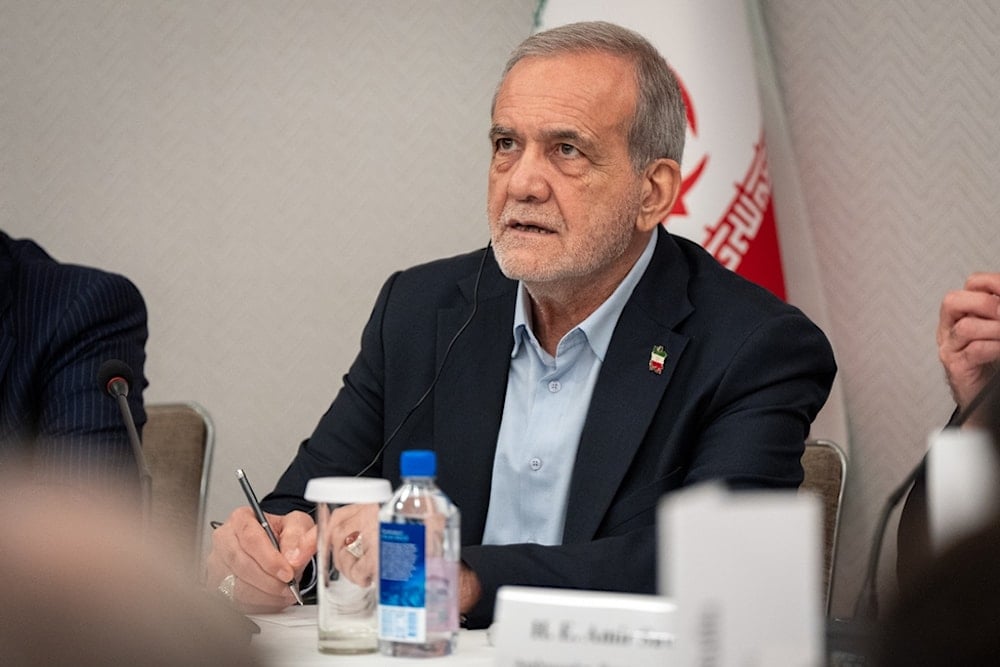Pezeshkian slams US proposal to trade uranium for sanctions relief
Iranian President Masoud Pezeshkian rejected US demands to surrender enriched uranium for short-term sanctions relief, denouncing coercive diplomacy as Tehran braces for renewed UN sanctions and deepens ties with BRICS and the SCO.
-

Masoud Pezeshkian, the President of Iran, takes questions from the media at a press briefing in New York, Friday, Sept. 26, 2025 (AP Photo/Angelina Katsanis)
Iranian President Masoud Pezeshkian on Saturday dismissed what he described as an unacceptable proposal from Washington that would have required Tehran to surrender all its enriched uranium to the United States in exchange for a short-term easing of sanctions.
"Naturally, we did not reach an agreement on the snapback mechanism because the US demands are unacceptable. They want us to transfer all our enriched uranium to them in exchange for three months, and this is by no means acceptable," Pezeshkian told Iran's state broadcaster, IRIB.
The Iranian president said the plan would have left Tehran vulnerable to renewed US pressure. "Had Tehran agreed, the US would have presented Iran with new demands or threatened to bring the sanctions back," he added.
Snapback, Sovereignty, Defiance
Pezeshkian's comments came as the United Nations prepares to reinstate sanctions on Iran under the so-called "snapback mechanism," after Western powers blocked Russian and Chinese efforts to delay the move. The reimposition would restore arms embargoes, asset freezes, and restrictions on enrichment, signaling a further breakdown in nuclear diplomacy.
The Iranian leader stressed that his government will continue to withstand Western sanctions by deepening economic and strategic cooperation with BRICS partners and the Shanghai Cooperation Organization, noting that Iran will rely on "the pride of the Iranian people and their yearning for independence."
The stance aligns with the position of Sayyed Ali Khamenei, who this week ruled out any direct negotiations with the United States, calling them "a sheer dead end." Analysts say this reflects a unified leadership intent on avoiding concessions that could weaken Iran's deterrence or domestic legitimacy.
Resistance, Retaliation, Resolve
Pezeshkian's defiance comes amid US concerns over Iran's reported expansion of underground nuclear facilities near Natanz, where construction has accelerated since the June aggression on Iran, when "Israel" carried out coordinated strikes on Iranian military and nuclear sites under the pretext of halting a clandestine weapons program, a charge Iran categorically denied.
The nearly two-week confrontation drew in the United States after its forces struck Iranian nuclear facilities on June 22, prompting Tehran to retaliate by targeting the Al Udeid Air Base in Qatar. The escalation raised fears of a regional war before June 23, when US President Donald Trump announced that "Israel" and Iran had reached a ceasefire, ending what he described as "the 12-day war."
Observers say Pezeshkian's remarks reflect Iran's determination not to trade its sovereignty or nuclear achievements for fleeting concessions, as Tehran shifts toward non-Western alliances and hardens its position against US-Israeli pressure. His message serves both as a rejection of coercive diplomacy and as a signal of Iran's intent to pursue strategic autonomy in the face of revived sanctions and renewed isolation attempts.
Read more: Iran recalls its ambassadors to E3 countries in response to sanctions

 3 Min Read
3 Min Read








